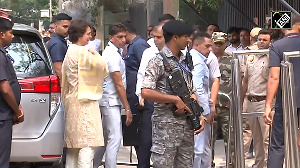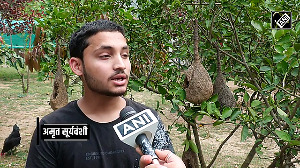Anxious executives from 150 Greater Noida factories met on Wednesday to take stock of the simmering labour unrest in the sprawling industrial township in the outskirts of Delhi after Graziano Transmissioni Managing Director Lalit Kumar Chaudhary was killed by a mob of retrenched workers on Monday.
Privately, many of them said it would now become hard to downsize in the impending industrial slowdown.
Disaster Timeline
- 1998: Graziano Trasmissioni India, now a part of the Oerlikon Group, sets up a greenfield plant at Greater Noida to make automotive components. Soon has 500 people on its rolls
- Dec 2007:Workers union makes first demand for higher wages
- 24 Jan 2008: Workers union and management sign a three-year wage pact. AITUC endorses it. Workers resume work only in February
- March 2008: Workers union switches allegiance from AITUC to CITU
- May 2008: Workers union strikes work after 5 trainees not confirmed. Management suspends 27 people
- June 2008: Workers vandalise company property. Management decides to 'lock out' 30. Workers decide to go slow. Talks between union, management, district administration, labour department and police fail. Italian ambassador voices concern to the Uttar Pradesh administration.
- 14 July 2008: Management reinstates 45 employees.
- 15 July 2008: Management fires 15 employees and 'forgives' 11.
- Aug & Sept 2008: More negotiations follow. Tension simmers. Workers allege 400 contract workers run the factory. Company says only 150 contract workers hired.
- 22 Sept 2008: Workers attack company premises, destroy property and kill MD Lalit K Chaudhary.
Companies in the area are known to employ contract labour in large numbers, though the law clearly states that such workers can be used only for non-core functions and not on the shop floor.
"If a private business is not doing well, the government does not foot the bill or take care of the losses. Who will support industry during a bad cycle?" said Sarbjit Singh, chairman and managing director, Noble group, which manufactures consumer electronics at Noida.
On their part, a number of Graziano workers expressed their ire at being replaced by contract workers. As such workers are not on their rolls, companies make substantial savings on their wage bills.
Some of these men said that the Graziano plant was being run by 400 contract workers in two shifts for the past three months. According to the company, only 150 of 650 workers were on contract.
To allay the fears of businessmen, the authorities have promised to dedicate a senior police officer to specifically look after security for industry in the area.
The Mayawati government at Lucknow responded by transferring two police officers out of the area.
So far, 138 people have been sent to judicial custody; 19 of them charged with attempting Chaudhary's murder. The Graziano factory wore a deserted look on Wednesday with nobody in sight.
The CEO of Oerlikon Drive Systems (Graziano is now an Oerlikon company), Marcelo Lamberto, said: "We are having internal discussions on the future. All commitments will be upheld."
Almost sure that they would lose their source of livelihood, some workers, including a few with serious injuries from Monday's clashes, said the conflict could have been avoided had the workers not wanted a union.
The workers first flirted with AITUC and then with CITU. Even the Hind Mazdoor Sabha tried to get a foothold in the company.
The trade union's national secretary, RA Mittal, said things wouldn't have come to such a pass had the company's management not obstructed the legitimate desire of its workers to get their union registered.
Any union can apply for registration if it is found to represent at least 10 per cent of the workers. According to Mittal, the registrar of unions turned down the application of Graziano workers not once but thrice.
Company officials were tight-lipped about the events that led to the current crisis. Greater Noida is a large industrial hub where several multinational and domestic firms have large production units.
Some of the big names in the township include LG, Samsung, Yamaha and Honda. All told, it houses about 500 units that employ tens of thousands of people.
While the permanent workers come from all over North, the casual contract workforce is drawn largely from adjoining areas.
Apprehensive that the incident may cast a shadow on overseas investment into India, Union Commerce and Industry Minister Kamal Nath said: "This stray tragic occurrence would not be allowed to mar India's position as an investment-friendly destination."







 © 2025
© 2025